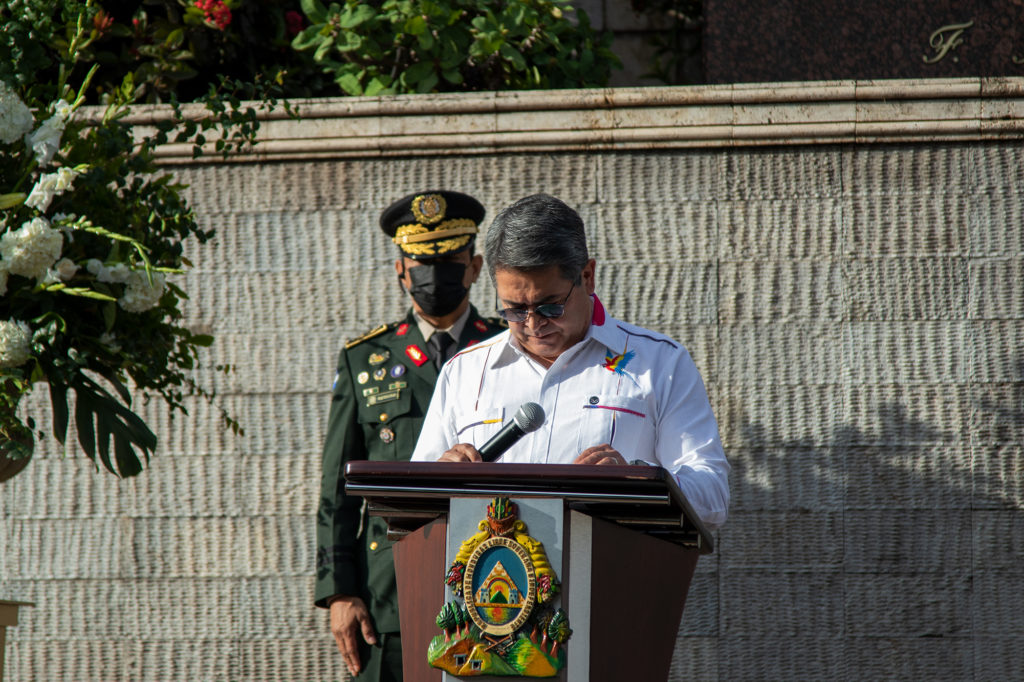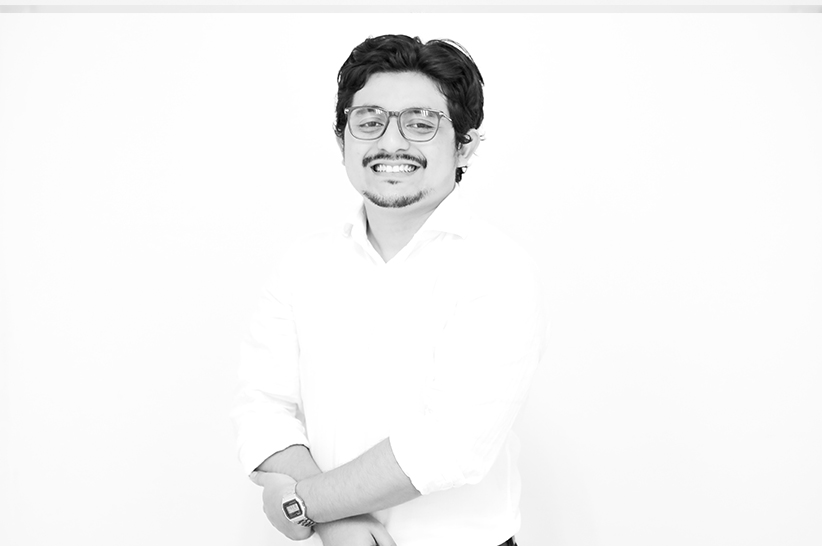Former Honduran president Juan Orlando Hernández, repeatedly accused of having direct ties to drug traffickers, became a representative to the Central American Parliament in a virtual swearing-in ceremony on January 27. This granted him immunity from prosecution and extradition. A few days earlier, Representative Norma Torres of California had sent a letter to the United States Department of Justice asking for the immediate extradition of Hernández for drug trafficking.
By Leonardo Aguilar
Photos by Fernando Silva and from Contracorriente’s archives
At noon on January 27, Juan Orlando Hernández became the most recent ex-president of Honduras when Xiomara Castro, the wife of former president José Manuel Zelaya Rosales (2006-2009) took office. A few hours later, Hernández was sworn in as a representative to the Central American Parliament (Parlamento Centroamericano – Parlacen), the political institution and parliamentary body of the Central American Integration System (Sistema de la Integración Centroamericana – SICA).
Hernández was sworn in by Guillermo Daniel Ortega Reyes, a Nicaraguan citizen who was elected to the Parlacen presidency for 2021-2022. The virtual ceremony included Ricardo Álvarez, another Honduran politician who has been accused of corruption, notably for the failed “Trans-450” project.
Guillermo Ortega is president of Nicaragua’s Christian Unity Party and an evangelical pastor. According to the digital media outlet Nicaragua Investiga, in September 2020 Ortega formed a political alliance with the Sandinista National Liberation Front (FSLN) headed by Nicaraguan president Daniel Ortega. The Central American Parliament was represented at Castro’s inauguration by Guillermo Ortega, Vice President Engels Pineda, and Secretary Nelsy Mencias.
In an article she wrote for Contracorriente, Representative Norma Torres of California said that she had written a letter to the U.S. Department of Justice requesting the immediate indictment and extradition of Hernández to stand trial on drug trafficking charges.
Torres wrote, “Hernández was identified as a co-conspirator in his brother’s case here in the United States, and the Department of Justice claims that Hernández played a leadership role in a violent, state-sponsored drug trafficking conspiracy. We must now seek justice for everyone ─ Americans, Hondurans, and others ─ who were harmed by his administration.”
Attorney Raúl Pineda Alvarado, an expert in the Honduran constitution, told Contracorriente that representatives to the Parlacen have immunity derived from the Treaty of Vienna and the Constitutive Treaty. This immunity is valid throughout Central America, but not in Costa Rica and Panama.
“Experience has shown that this immunity is precarious because the Parlacen plenary is quick to strip a representative’s immunity whenever a legal problem arises,” Pineda said. He doubts that the Parlacen will protect Hernández from extradition, “To say that the Paralcen is a refuge for impunity is not quite true since every Parlacen representative with legal problems in the past has been ousted.”
Some former presidents like Mauricio Funes of El Salvador were not as fortunate as Hernández. El Faroreported that when his presidency ended, the Parlacen refused to accept him as a representative.
There are noteworthy precedents for the withdrawal of Parlacen immunity. In 2004, Guatemala’s Constitutional Court declared unconstitutional the immunity enjoyed by some high-level officials. Former Guatemalan President Alfonso Portillo and former Vice President Juan Francisco Reyes were subsequently prosecuted and convicted in corruption cases.
Twenty representatives from Honduras are elected to the Central American Parliament in the country’s general elections, but two additional representatives can be appointed if they wish to serve ─ the outgoing president and vice-president (or presidential appointee, in the case of Ricardo Álvarez).
“At the end of his or her term, the president of Honduras must indicate his or her intention to join the Central American Parliament. Some presidents like Ricardo Maduro have declined to join,” said Pineda, adding that once Hernández was sworn in, he was covered by the same prerogatives, privileges, and immunities enjoyed by the elected representatives.
Juan Orlando Hernández will serve alongside Mauricio Oliva Herrera and José Benedicto Santos Castro, who will represent Honduras in the Parlacen even though they ran for public office in the most recent general elections. Article 115 of the Electoral Law of Honduras states that candidates for public office cannot simultaneously run for other popularly elected positions.
Mauricio Oliva served as president of the National Congress for two consecutive eight-year terms and was criticized for kowtowing to Hernández and for approving laws such as a new Penal Code that reduced penalties for corruption and drug trafficking. He also shepherded through detrimental laws on state secrecy and the law authorizing Employment and Economic Development Zones (Zonas de Empleo y Desarrollo Económico – ZEDE),
Other Hondurans in the Parlacen include officials such as former congressional representative Juan Carlos Valenzuela, who was named on the U.S. State Department’s Engel List. Individuals from El Salvador, Guatemala, and Honduras accused of corruption, undermining democratic processes or institutions, and blocking investigations have been named on the Engel List. Another Parlacen representative from Honduras is Nilvia Castillo, a former mayor of Tegucigalpa who faced charges for embezzling US$1.14 million along with Nasry Asfura, the most recent mayor of Tegucigalpa.
Can Hernández be extradited as a sitting Parlacen representative?
Raúl Pineda claims that the Parlacen immunity that covers Hernández doesn’t protect him as much as some may think, nor does it ensure impunity for any specific time period; “This immunity is only in effect if the individual in question remains in one of the Central American countries and has not been disqualified by the Parlacen. Once an extradition request is received by a Central American government, it notifies the Parlacen, which follows an established procedure and can strip the individual of immunity. Once immunity has been withdrawn by the Parlacen, the country represented by the individual ─ Honduras in this case ─ hands him over to the country that issued the extradition request.”
Pineda says that Juan Orlando Hernández has two options; “One is to retire from politics and live in Lempira (department), enjoying all his money. The other option is for the US to put him on trial. It’s difficult to predict what will happen to him. I can tell you that we’ll see some sort of resolution before June.”
Joaquín Mejía Rivera, an expert in international law, told Contracorriente that the Central American Parliament has become a white elephant that “serves absolutely no purpose.” The only thing it’s good for, said Mejía, is to “take in people pursued by the law for drug trafficking and corruption, which is regrettable.”
Former Central American presidents accused of corruption who immediately joined the Parlacen to obtain immunity include Guatemala’s Jimmy Morales, who still has corruption cases under investigation; El Salvador’s Norman Quijano, whose immunity has already been withdrawn; and Panama’s Ricardo Martinell, who is also under investigation for various corruption cases.
Mejía says that President Xiomara Castro, who took office on January 27, should follow the example of Panama and Costa Rica and rethink the country’s role in the Central American Parliament. In fact, Costa Rica has never wanted to belong to the institution.
Regarding Juan Orlando Hernández and his drug-related legal problems in the United States, Mejía said that any immunity conferred by the Parlacen does him no good since the United States only recognizes immunity conferred by individual countries and the Parlacen’s immunity only applies to the Central American countries.
“It’s evident that Hernández’s rapprochement with Daniel Ortega’s administration over the last few years had a very specific purpose,” said Mejía. “Let’s not forget that Nicaragua has become a refuge for former presidents and prime ministers who have been accused of corruption in their native countries. A clear example is Mauricio Funes, the former president of El Salvador. Others have also taken refuge in Nicaragua. We need to view the close relationship between Hernández and Ortega in this light,” Mejía said.







